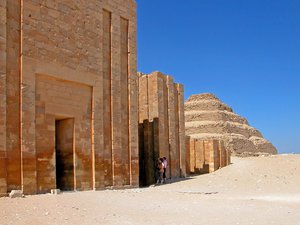Drama
Drama is the specific mode of narrative, typically fictional, represented in performance. The term comes from the Greek word δρᾶμα, drama, meaning action, which is derived from the verb δράω, draō, meaning to do or to act. The enactment of drama in theatre, performed by actors on a stage before an audience, presupposes collaborative modes of production and a collective form of reception. The structure of dramatic texts, unlike other forms of literature, is directly influenced by this collaborative production and collective reception. The early modern tragedy Hamlet (1601) by Shakespeare and the classical Athenian tragedy Oedipus the King (c. 429 BC) by Sophocles are among the masterpieces of the art of drama. A modern example is Long Day's Journey into Night (1956) by Eugene O’Neill.
The two masks associated with drama represent the traditional generic division between comedy and tragedy. They are symbols of the ancient Greek Muses, Thalia and Melpomene, the Muse of comedy represented by the laughing face, and the Muse of tragedy represented by the weeping face, respectively. Considered as a genre of poetry in general, the dramatic mode has been contrasted with the epic and the lyrical modes ever since Aristotle's Poetics (c. 335 BC)—the earliest work of dramatic theory.

Drama!
"Drama!" is the first single released by Erasure from their fourth studio album Wild!. It was issued by Mute Records in the UK and Sire Records in the U.S.
Written by Vince Clarke and Andy Bell, the synthpop song begins with a low-key keyboard line and a subdued vocal from Bell. As the song progresses, the instrumentation and vocals become more hectic, ultimately ending as a full-blown dancefloor anthem. "Drama!" is known for its mob-shouted "Guilty!" exclamation throughout and Bell's intricate, multi-layered background vocals. Lyrically the song addresses a person who could be considered a drama queen, experiencing "one psychological drama after another" about everyday struggles that are universal and are easily dealt with by most people. Lines such as "your shame is never-ending!" are directed at the subject of the song. The mob's vocals were added to by The Jesus and Mary Chain, who happened to be recording in the studio next door.
Released prior to Wild!, "Drama!" continued Erasure's winning streak on the UK singles chart, peaking at number four. In Germany the single also fared well, hitting number twelve. "Drama!" did not continue Erasure's chart success in the United States, where it failed to enter the Billboard Hot 100. It did, however, climb to number ten on the U.S. Hot Dance Music/Club Play chart.

Drama (Bananarama album)
Drama is the ninth studio album by the British female vocal duo Bananarama. It features eleven newly recorded tracks, along with a remix of their 1986 smash hit "Venus" (done by Soft Cell's Marc Almond) and a 2005 remix of their 1982 hit "Really Saying Something", an underground bootleg club hit produced by Solasso.
Drama is a comeback of sorts for Bananarama members Keren Woodward and Sara Dallin and is their first album to be released in their native UK since 1993. The album's first single "Move in My Direction" debuted on the UK Singles Chart at Number 14, also becoming their first UK Top 40 hit since 1993. The second single, "Look on the Floor (Hypnotic Tango)", also hit the UK Top 40, and climbed to Number 2 on the US Hot Dance Club Play chart as an import, becoming Bananarama's biggest US dancefloor hit since "Venus" two decades earlier.
The album mostly incorporates pop and eurodance musical styles, with some synthpop elements. Drama charted at a number 169 in the UK. It was later released in the United States (both in retail stores and as digital downloads) in 2006. While the album performed well on Billboard's Top Electronic Albums chart, peaking at number 21, it did not chart on the Billboard 200, the US Pop Albums chart.
Drama
Drama is the specific mode of narrative, typically fictional, represented in performance. The term comes from the Greek word δρᾶμα, drama, meaning action, which is derived from the verb δράω, draō, meaning to do or to act. The enactment of drama in theatre, performed by actors on a stage before an audience, presupposes collaborative modes of production and a collective form of reception. The structure of dramatic texts, unlike other forms of literature, is directly influenced by this collaborative production and collective reception. The early modern tragedy Hamlet (1601) by Shakespeare and the classical Athenian tragedy Oedipus the King (c. 429 BC) by Sophocles are among the masterpieces of the art of drama. A modern example is Long Day's Journey into Night (1956) by Eugene O’Neill.
The two masks associated with drama represent the traditional generic division between comedy and tragedy. They are symbols of the ancient Greek Muses, Thalia and Melpomene, the Muse of comedy represented by the laughing face, and the Muse of tragedy represented by the weeping face, respectively. Considered as a genre of poetry in general, the dramatic mode has been contrasted with the epic and the lyrical modes ever since Aristotle's Poetics (c. 335 BC)—the earliest work of dramatic theory.
Latest News for: carillon drama
Student of the Week Greenon High School
- 1
- 2
- 3
- 4
- 5
- Next page »




































